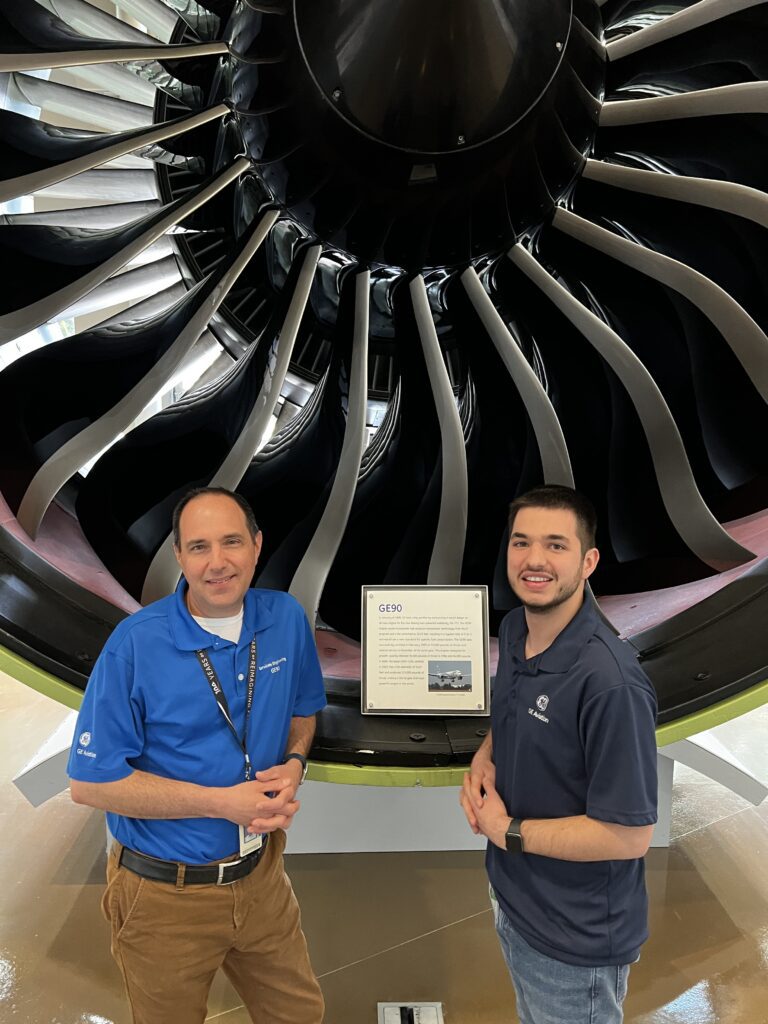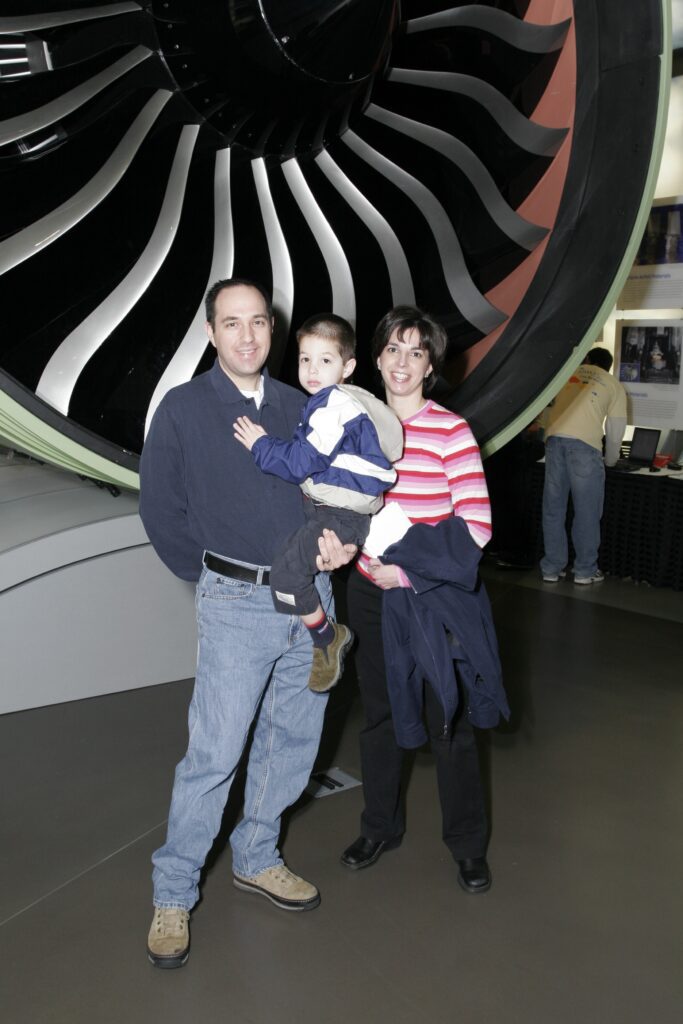A Family Affair: Father and Son Find Love of Aerospace Engineering, and GE
April 21, 2022 | by Sridhar Pappu
By the time Matt Sabo’s son, Ben, was in grade school, it was clear he was made for engineering. Sabo, whose love of aerospace engineering eventually led him to a job at GE Aviation, was all too happy to dispense some fatherly wisdom: “Stay close to the product. The more hands-on you are, the better engineer you’re going to be.”
This was, admittedly, part parental advice, part recruitment tool for Sabo’s professional family at GE. Sabo joined the company in the middle of his career and has spent time in numerous areas at GE Aviation over the past 16 years. He started as a shop floor engineer at the Aviation Component Services Center (ACSC) in Cincinnati and went on to work in material services, then advanced technology repair and sourcing, earning a Six Sigma black belt along the way. Now he oversees investment support as an engineer in Test Systems Engineering. But having worked outside of GE, he has a deep appreciation for the time, access and direct experience he and his fellow engineers experience with the products.
“What I like about GE is its cutting-edge technologies,” Sabo says about his decision to join GE Aviation. “You have some of the best engineers in the world working on some of the best products in the world. And what’s fascinating is how large of a footprint GE has, and the fact that you really have the opportunity to do so many different roles. GE is very open to saying, ‘You may not step into a role knowing everything, but you’ve got the right skill set. We’ll give you the opportunity to learn, to grow, to take on new roles.’”
It turns out that as Sabo was moving through his own career at GE, he was busy raising a potential employee at home. When Ben was only four, his parents learned that they had to hide their screwdrivers, otherwise the boy would occupy himself taking cabinet doors off their hinges. In high school, Ben dove into robotics and became an enthusiastic member of his school’s robotics team, which his father helped mentor.
Sabo was not shy about introducing his son to engineering life at GE Aviation. Whenever the company hosted family fun days, he’d bring Ben to the campus so he could gawk at a Black Hawk helicopter, tour the shop floor and see jet engines in various stages of construction and repair. Ben even joined GE Aviation’s Explorer Post 303 program, which provides high school students who have a keen interest in engineering with six to eight weeks of behind-the-scenes education.
When it came time for college, Ben followed his father’s path to the College of Engineering at the University of Cincinnati, where he’s pursuing a degree in computer engineering. And in January, he began a co-op program at GE Aviation’s plant in Lynn, Massachusetts, working on control systems for turboshaft/turboprop engines such as the T700/CT7 helicopter engine.
“He’s pretty excited, [because] he’s had an opportunity to get into the labs and do hands-on stuff,” Sabo says. “You know, not all co-ops are created equal. We don’t hold back. We ask these young people to do some pretty heavy lifting.” Even if an intern or co-op doesn’t end up working at GE, Sabo sees the experience they gain as “priceless.”
He’s doing his best to let Ben blaze his own trail, but he can’t help putting in a plug for GE now and then. “I’m trying not to influence him,” Sabo says. “He needs to decide how it’s all going to work out for him.”
Whether it’s through electric, hybrid or hydrogen-fueled engine technology, Sabo sees the next couple of decades as a dynamic time at GE Aviation. “I mean, it’s going to be a complete invention,” he says. “Which is what GE does, right? We invent the future of flight. That’s exactly why our purpose statement is what it is.”
This was, admittedly, part parental advice, part recruitment tool for Sabo’s professional family at GE. Sabo joined the company in the middle of his career and has spent time in numerous areas at GE Aviation over the past 16 years. He started as a shop floor engineer at the Aviation Component Services Center (ACSC) in Cincinnati and went on to work in material services, then advanced technology repair and sourcing, earning a Six Sigma black belt along the way. Now he oversees investment support as an engineer in Test Systems Engineering. But having worked outside of GE, he has a deep appreciation for the time, access and direct experience he and his fellow engineers experience with the products.
 Matt and Ben Sabo standing in front of the same GE90 engine 16+ years after their first photo in front of the engine.
Matt and Ben Sabo standing in front of the same GE90 engine 16+ years after their first photo in front of the engine.
“What I like about GE is its cutting-edge technologies,” Sabo says about his decision to join GE Aviation. “You have some of the best engineers in the world working on some of the best products in the world. And what’s fascinating is how large of a footprint GE has, and the fact that you really have the opportunity to do so many different roles. GE is very open to saying, ‘You may not step into a role knowing everything, but you’ve got the right skill set. We’ll give you the opportunity to learn, to grow, to take on new roles.’”
It turns out that as Sabo was moving through his own career at GE, he was busy raising a potential employee at home. When Ben was only four, his parents learned that they had to hide their screwdrivers, otherwise the boy would occupy himself taking cabinet doors off their hinges. In high school, Ben dove into robotics and became an enthusiastic member of his school’s robotics team, which his father helped mentor.
Sabo was not shy about introducing his son to engineering life at GE Aviation. Whenever the company hosted family fun days, he’d bring Ben to the campus so he could gawk at a Black Hawk helicopter, tour the shop floor and see jet engines in various stages of construction and repair. Ben even joined GE Aviation’s Explorer Post 303 program, which provides high school students who have a keen interest in engineering with six to eight weeks of behind-the-scenes education.
 Matt, Ben and Rachel Sabo Their first family fun day at the GE Aviation Learning Centre in Evendale, Ohio, in 2006.
Matt, Ben and Rachel Sabo Their first family fun day at the GE Aviation Learning Centre in Evendale, Ohio, in 2006.
When it came time for college, Ben followed his father’s path to the College of Engineering at the University of Cincinnati, where he’s pursuing a degree in computer engineering. And in January, he began a co-op program at GE Aviation’s plant in Lynn, Massachusetts, working on control systems for turboshaft/turboprop engines such as the T700/CT7 helicopter engine.
“He’s pretty excited, [because] he’s had an opportunity to get into the labs and do hands-on stuff,” Sabo says. “You know, not all co-ops are created equal. We don’t hold back. We ask these young people to do some pretty heavy lifting.” Even if an intern or co-op doesn’t end up working at GE, Sabo sees the experience they gain as “priceless.”
He’s doing his best to let Ben blaze his own trail, but he can’t help putting in a plug for GE now and then. “I’m trying not to influence him,” Sabo says. “He needs to decide how it’s all going to work out for him.”
Whether it’s through electric, hybrid or hydrogen-fueled engine technology, Sabo sees the next couple of decades as a dynamic time at GE Aviation. “I mean, it’s going to be a complete invention,” he says. “Which is what GE does, right? We invent the future of flight. That’s exactly why our purpose statement is what it is.”





